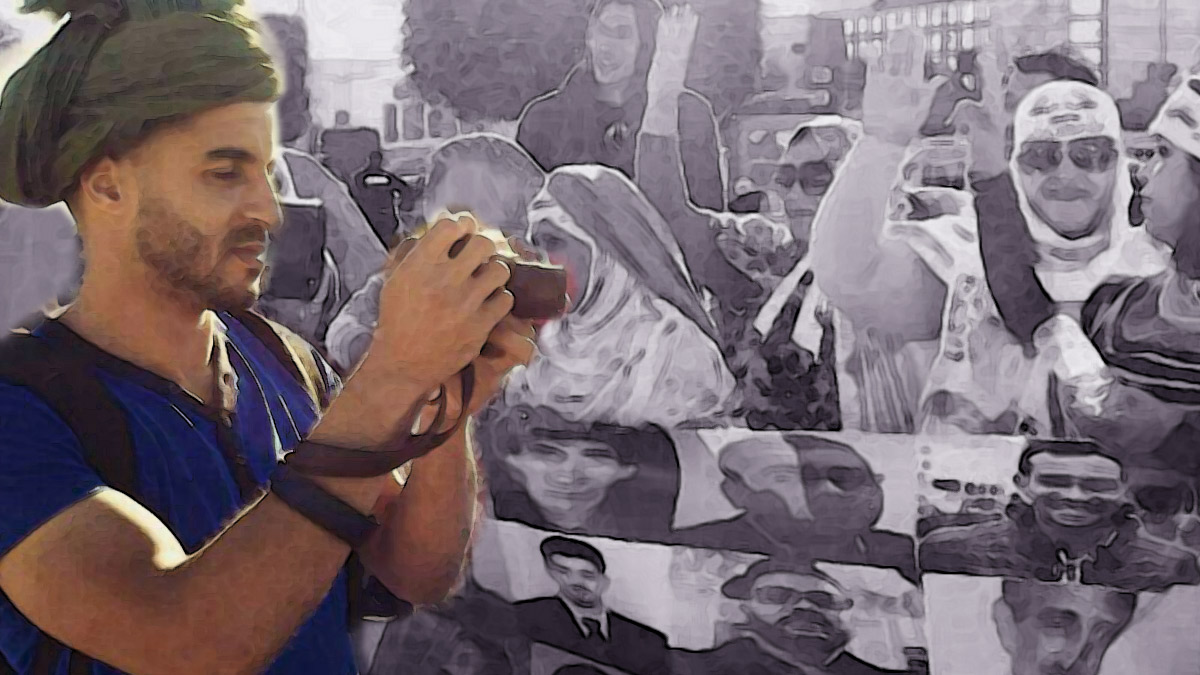Sayid Ameidan Jornalista saharaui
Texto original e versão portuguesa
My revenge is to denounceA minha vingança é a denúnciaSayid is a quiet and educated young man, with sadness in his eyes but an easy smile, he has a soft voice and tells in a low tone his story, one more in the endless suffering of the Saharawi people.
”My greatest suffering is not my tortures or the fact that my brothers have been arrested, my greatest suffering is my mother’s suffering. That is what saddens me.”
If you don’t not know the Saharawi you will not understand the depth of this feeling, for the Saharawi a woman is untouchable, violence against women is unacceptable in this society.
Sayid was arrested at the age of seventeen at the Secondary School, the occupation authorities entered the building to repress a peaceful protest of Saharawi students who are subject to discrimination and constant insults inside the classrooms. In the courtyard of the School they beat him to the point of bleeding from his head and fainting, he was tortured for a day and then released, but only for a little while, a month later he was again in the hands of the executioner to be tortured … four days of arbitrary detention.
His family’s house was invaded by the authorities twice in his absence. One of the times they beat the whole family, women, children and young people.”My little brother was hiding in the closet and through a crack he saw everything how they tortured them until they were all without moving on the floor, covered in blood, he started to cry quietly and was almost discovered by the police.”
The second time they dragged Sayid’s mother by the hair and threw her down the stairs, again she had fractures.
The reality of Sayid is the reality of all Saharawi in occupied territories, torture, arbitrary detention, kidnapping and home invasion. Constant, systematic traumatizing violence, at the hands of the Moroccan occupation regime.
I do not ask what torture he has suffered, for more than a decade I have recorded the tortures of the Saharawi they are an endless horror that can be only compared to the Inquisition in medieval times. On several occasions I hear “and then the police and the gendarmerie argued which of them could torture me …” What kind of country, what kind of human beings are these who are fighting for the right to torture another human being? What institutions, what values are there in this Realm of Terror?
My revenge is the complaint
Sayid, does not want physical revenge:
“this will not solve anything, it can give me immediate satisfaction but it will not change anything in my future, I will continue to suffer, my revenge is the denunciation so I decided to be a journalist, break the silence .. . ”
Sayid wants to break the silence, he does so on a daily basis with the conscience that at any moment he can be thrown to the dungeons like his brother who is hundreds of km away from home, in a Moroccan prison. My brother suffers but this is our destiny for fighting for our independence, it is the suffering of my mother that I can not bear, the distance that she has to travel to visit her son, bring him food, and sometimes not be allowed to see him because the prison administration refuses the visit arbitrarily.
Sayid wants to break the silence and our duty is to help him, listen to him and speak of this people, the Saharawi, the last colony of Africa.Sayid é um jovem calado e educado, com tristeza nos olhos mas um sorriso fácil, tem uma voz suave e conta em tom baixo a sua história uma mais num role sem fim de sofrimento do povo saharaui.
”O meu maior sofrimento não são as minhas torturas ou o facto da prisão dos meus irmãos, o meu maior sofrimento é o sofrimento da minha mãe. Isso é o que me entristece.”
Quem não conhece os saharauis não ira entender a profundidade deste sentimento, para os saharauis uma mulher é intocável, a violência contra as mulheres é inaceitável, nesta sociedade.
Sayid foi detido com 17 anos dentro da Escola Secundária, as autoridades de ocupação entraram no edifício para reprimir um protesto pacífico dos estudantes saharauis que são objecto de discriminação e insultos constantes dentro das salas de aulas. No recinto da Escola espancaram-no até sangrar da cabeça, foi torturado durante um dia e solto em seguida, mas por pouco tempo, passado um mês já estava de novo nas mãos do verdugo a ser torturado, 4 dias de detenção arbitrária.
A casa da sua família foi invadida pelas autoridades por duas vezes na sua ausência. Numa delas espancaram toda a família, mulheres, crianças e jovens.”o meu irmão pequeno estava escondido no armário e por uma fresta viu tudo como os torturaram até estarem todos sem se mexerem no chão, cobertos de sangue, começou a chorar baixinho e quase foi descoberto pela policia.”
Na segunda vez arrastaram a mãe de Sayid pelos cabelos até à escada e atiraram-na, mais uma vez teve fracturas.
A realidade de Sayid é de muitos saharauis, torturas, detenções arbitrárias, sequestros e invasões domiciliárias. Violência constante, traumatizante e sistemática de um regime de opressão.
Não pergunto que torturas sofreu, há mais de uma década que registo as torturas são um sem fim de horror que se pode comprar à inquisição. Em várias ocasiões oiço “e depois a policia e a gendarmaria discutiram que me ia torturar…” Que país? que seres humanos são estes que disputam o direito da tortura? Que instituições, que valores existem neste Reino de Terror?
A minha vingança é a denúncia
Sayid, não quer vingança física:
” isso não me vai resolver nada, pode dar-me satisfação imediata mas não vai mudar nada no meu futuro, continuarei a sofrer, a minha vingança é a denúncia por isso decidi ser jornalista, romper o silêncio…”
Sayid quer romper o silêncio, diariamente com a consciência que a qualquer minuto pode ser atirado para o calabouço como o seu irmão que está a centenas de km numa prisão marroquina. O meu irmão sofre mas é esse o nosso destino por lutarmos pela nossa independência, é o sofrimento da minha mãe que não suporto, a distância que tem que percorrer para visitar o seu filho, levar-lhe comida, e por vezes não poder entrar porque lhe recusam a visita de forma arbitrária.
Sayid quer romper o silêncio e nosso dever é ajuda-lo, escuta-lo e falar deste povo, os saharauis, a última colónia de África.




